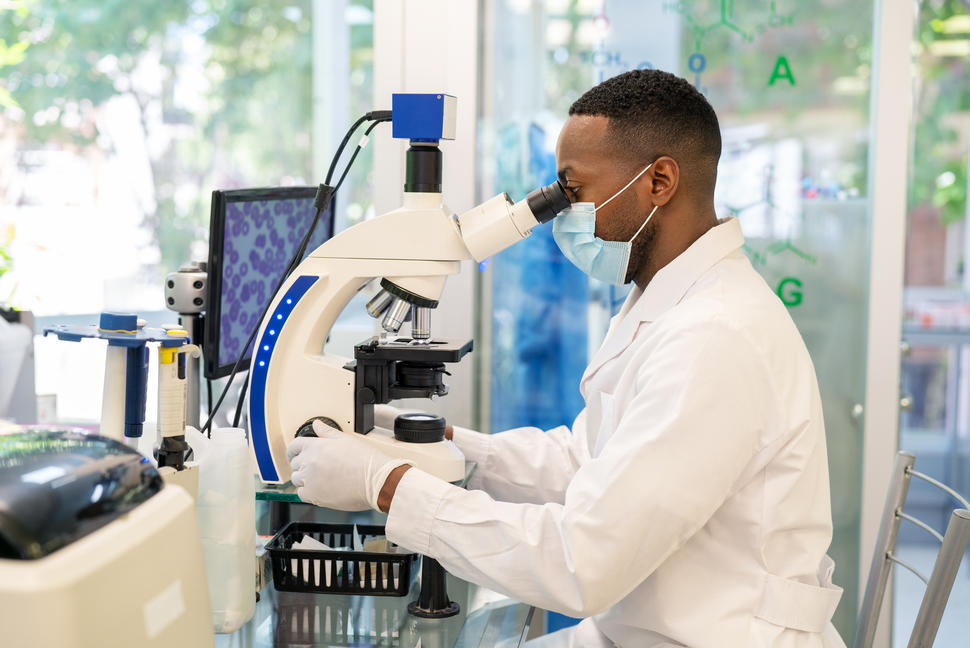The Importance of Cancer Diagnosis Research
Advances in the diagnosis of cancer have the potential to improve outcomes for many patients with the disease. Doctors and patients depend on accurate information from diagnostic tools, such as laboratory tests, imaging studies, and genomic analyses, to make decisions at all stages of cancer care. Diagnostic tools can:
- provide information about a cancer’s site of origin
- help determine the extent of cancer within the body, called staging
- show whether a cancer is likely to have been caused by an inherited genetic change
- indicate whether a tumor is a specific subtype based on genetic alterations in the cancer
- inform decisions about treatment, such as identifying the treatment that is most likely to be effective for a patient
- assess a patient’s response to therapy
- monitor a patient for a recurrence of cancer
- help estimate prognosis
Diagnostic tools that identify specific molecular alterations in tumors are also important in the context of precision medicine. With this information, doctors can determine whether a patient will likely benefit, or likely not benefit, from a particular targeted therapy. In recent years, when the Food and Drug Administration (FDA) has approved a new targeted treatment, it has often approved tests called companion diagnostics that can be used to determine if a patient’s tumor has the target for that therapy. This approach can spare patients from the costs and side effects of a treatment that is unlikely to work for their cancer.
However, creating diagnostic tools that accurately predict how well a cancer will respond to treatment is a challenge, particularly given the heterogeneity of tumors, how quickly molecular changes occur within tumors during and after treatment, and the fact that some tumors are difficult to access in the body.
Cancer diagnosis research is critical to address these challenges, and advancements are on the horizon. For example, researchers are developing technologies to diagnose cancers based on molecules that cancer cells shed into the blood and other body fluids. Also, innovative imaging technologies, coupled with artificial intelligence, may be able to identify the presence, type, stage, and major genetic features of a cancer without the need for an invasive biopsy.
However, as the technology for identifying tumors improves, there is an urgent need to develop diagnostic tools that provide information about the likelihood that a given tumor will be life-threatening. This information is critical to prevent overdiagnosis and avoid any toxic side effects or financial burdens caused by an unnecessary treatment for the patient.
Selected NCI Activities in Cancer Diagnosis Research
NCI supports a broad portfolio of research aimed at improving the diagnosis of cancer. This work includes research on novel tools and methods for diagnosing cancer as well as the development of tests and imaging technologies that can provide specific information about a person’s disease. Other priorities include the development of diagnostic tools that can be used in low-resource settings and laboratory research.
Examples of NCI-supported activities in cancer diagnosis research include:
- The Cancer Diagnosis Program supports cancer diagnosis research at medical centers, hospitals, businesses, and universities throughout the United States. Investigators supported by the Cancer Diagnosis Program work on a range of projects, from the development of novel diagnostic technologies to the improvement of patient-derived models to better characterize cancers.
- NCI supported a precision medicine trial called NCI-MATCH (Molecular Analysis for Therapy Choice), which is considered the largest precision medicine trial in history. NCI-MATCH aimed to determine the effectiveness of treating tumors based on matching targeted therapies to specific genetic alterations in the tumors, regardless of tumor type. The trial showed that people with advanced cancer may benefit from this type of precision diagnosis using genomic sequencing to help plan their treatment.
- The National Clinical Trials Network (NCTN) Biobanks include a large collection of cancer clinical trial biospecimens for researchers to use for the discovery of genes, proteins, and other substances (collectively called biomarkers) that can provide information that is important for accurate cancer diagnosis and precision medicine approaches. NCI encourages the biomedical research community to use these biospecimens, regardless of whether the researcher is a member of an NCTN group.
- The Cancer Imaging Program supports research on the use of imaging techniques to noninvasively diagnose cancer and identify disease subsets in patients. One focus of the program is functional and molecular imaging, which visualizes physiological, cellular, or molecular processes in living tissues as they occur.
- As part of the Cancer Imaging Program, researchers at In Vivo Cellular and Molecular Imaging Centers conduct collaborative, multidisciplinary research on cellular and molecular imaging related to cancer. In addition, the Quantitative Imaging Network promotes research, development, and clinical validation of quantitative imaging tools and methods, with the overall goal of facilitating clinical decision-making.
- The Consortium for Imaging and Biomarkers integrates imaging strategies with biomarkers into complementary screening and diagnosis approaches. The consortium aims to identify early-stage aggressive cancers and distinguish lesions that are life-threatening from those that are not.
- NCI supports research on the use of artificial intelligence and machine learning to make sense of large amounts of tumor data, including detailed molecular characteristics and physical features of single cancer cells, tumor images, and other spatial data, that can be leveraged for more accurate cancer diagnoses.
Recent Research Findings in Cancer Diagnosis Research
- Screening People at High Risk for Pancreatic Cancer May Help Them Live Longer
- Liquid Biopsies on the Horizon for Children with Solid Cancers
- Artificial Intelligence Expedites Brain Tumor Diagnosis during Surgery
- Smarter Prostate Cancer Diagnosis
- Why Have Thyroid Cancer Diagnoses Spiked for US Women?
- For Early-Stage Lung Cancer, Study Identifies Potential New Biomarker, Treatment Target


